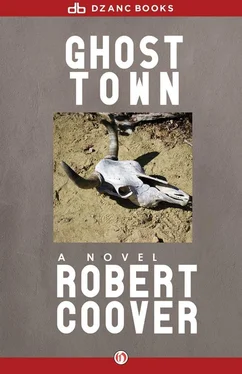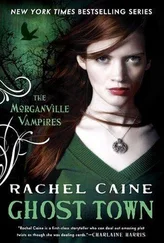Robert Coover - Ghost Town
Здесь есть возможность читать онлайн «Robert Coover - Ghost Town» весь текст электронной книги совершенно бесплатно (целиком полную версию без сокращений). В некоторых случаях можно слушать аудио, скачать через торрент в формате fb2 и присутствует краткое содержание. Год выпуска: 2014, Издательство: Dzanc Books, Жанр: Современная проза, на английском языке. Описание произведения, (предисловие) а так же отзывы посетителей доступны на портале библиотеки ЛибКат.
- Название:Ghost Town
- Автор:
- Издательство:Dzanc Books
- Жанр:
- Год:2014
- ISBN:нет данных
- Рейтинг книги:3 / 5. Голосов: 1
-
Избранное:Добавить в избранное
- Отзывы:
-
Ваша оценка:
- 60
- 1
- 2
- 3
- 4
- 5
Ghost Town: краткое содержание, описание и аннотация
Предлагаем к чтению аннотацию, описание, краткое содержание или предисловие (зависит от того, что написал сам автор книги «Ghost Town»). Если вы не нашли необходимую информацию о книге — напишите в комментариях, мы постараемся отыскать её.
Ghost Town — читать онлайн бесплатно полную книгу (весь текст) целиком
Ниже представлен текст книги, разбитый по страницам. Система сохранения места последней прочитанной страницы, позволяет с удобством читать онлайн бесплатно книгу «Ghost Town», без необходимости каждый раз заново искать на чём Вы остановились. Поставьте закладку, и сможете в любой момент перейти на страницу, на которой закончили чтение.
Интервал:
Закладка:
The storm has left behind a noonday sun, shining down upon him now through the roofless jailhouse ruins. His twisted cell door is agape, and his old gunbelt and wooden-butted six-shooter is hanging on a coat hook on one of the walls left standing by the storm. There seems no reason not to do so, so he goes over and buckles it on, and as he does this he remembers that before the men went out (or maybe after) he was visited by a one-eyed photographer, which he took to be an unfavorable sign, or more than one. He was a cadaverous plug-hatted man with a Chinaman’s beard, and he was a voluble enthusiast of his trade. He insisted on showing him his sheaf of photographs of hanged men, giving him a poke in his lower regions with his rifle barrel and jerking on his earring when he showed no immediate interest and closed his eyes. It was his studied opinion, the man said, spreading out his samples and compelling his attention, that a photograph of one hanged man has a more melancholical aspect about it than do those of groups, though men strung up in multitudes of a dozen or more not only provide peculiar challenges and opportunities for the enterprising photographist, being less of a stereotype, as might be said, but they also have a way of opening up the foreground to pictorial scrutiny and drawing attention to those who have not yet been hanged. Put another way, one man suspended solo has a single sad tune to play, while a couple of dozen make a whole band of bemingled and crisscross medleys. They say two’s company, the one-eyed man went on to say, tobacco juice dribbling down his stringy goatee and dripping onto his photos, adding to their sepia tonalities as he rubbed it in with a long bony finger, but it aint. Lookit these two renegade injuns hangin here: yu aint never seed nuthin lonelier-lookin than thet! One varmint pendin’s like astin a worrisome question. Two’s like mockin each other in their silly neck-broke dangle and they aint neither of em got nuthin t’say. I sometimes like t’lookit my pitchers a two men hangin jest fer a hoot. Three’s most folks’ fayvrit, it’s a kinder mystery, like yu know whut two of em’re doin up thar, but whut about the third? Like as not it’s a mistake, like he wuz jest stumblin along’n fell inta the noose. Ifn hangin a person ever is a mistake, thet is. My own fayvrit number, though, is four. Thet’s about the most cloud-kickers yu kin string up in concert and see the whole pattern of em, whilst takin in each one of em at the same time, so’s yu git sumthin combined of all the others. Mostly, though, it’s on accounta my special regard fer gallows arkytetcher. Jest lookit these here pitchers, how differnt they all are, they’s so many novel’n wondrous ways’n shapes a hangin four men all at wunst, and danglin four of em together has a way a bringin out the grain in the wood and drawin yer eye t’the empty space neath their ascended boots. Which a course is the whole reason them estimable things git built.
Rifle now cocked and ready, he peers cautiously out the gaping hole where the street door used to be and sees that no boots will be ascended today, his or any other’s. The debris of the gallows, wrecked by the black mare, has been mostly blown away by the storm, nothing left in the wide dusty street but a few scattered splinters like frail bleached reminders of some previous resolve. Now what there is of intent can be measured only by the ominous absence of any evidence of it, for nothing moves. Not even the lace curtain in the window above the saloon sign. The weathered wooden buildings, utterly forsaken under the baking sun, look fatigued and shrunk into themselves, a grim dead silence sunk into everything the way drink can sodden a man. But that they are waiting for him out there some place, or places, of course he has no doubt. The moment for it has come.
Across the way the bank doors are hanging loose off their hinges as usual, and though it’s about a hundred yards across a wide-open space, masonry’s a better shield than timber, and he figures if he could make it over there he might have more of a chance, or at least last a little longer. He exposes himself briefly on the jailhouse porch, then ducks back inside. Nothing happens, so he checks his six-shooter (a single shot’s been fired; he reloads it), tugs his broad-brimmed hat down over his brow as though felt might fend off lead, cleans his ears out, and gets ready to run. There’s a kind of presence out there, like a filled-up space inside the empty space that’s seen, created by the portentous hour and walled by nothing but its own taut necessity, and when he enters into it, there’ll be no way out until it isn’t there anymore, or he isn’t.
A piece of the jailhouse wall behind him suddenly topples inward, breaking the solemn hush: he whirls to fire, but there’s no one there, and then, even as he watches, another piece of wall folds over like a starched collar and, after a creaking moment, slides wearily to the floor with a splintering crash. Yes, all right. Time to go.
He hunkers down, counts to three, and then charges off on a zigzagging run into the street, heart and legs pumping, expecting the whole world any moment to explode around him and bring a sudden searing end to things. This doesn’t happen, not yet, but crossing that space seems to take him years, his boots pounding and pounding the dusty arena where the gallows once stood, his hands sometimes slapping it as well as he ducks and bobs, the distance between him and the bank seeming to lengthen even as he scrambles toward it, and he feels as if caught up in one of those endless tribal hunting dances, he the designated buffalo-headed prey — or the mock prey, maybe it’s all the same — his churning legs benumbed and leaden now and his cumbersome head weighing upon his neck and bobbing on its own for lack of strength to do otherwise. He’s not going to make it across, it’s too far. He can no longer rise from his staggering crouch, it’s all duck and no bob, his wind is going, his hat’s already gone, shot away maybe, if they are shooting at him, can’t be sure, what with the blood roaring in his ears, his sight bleared by sweat and desperation.
But then, just as his knees are giving way, he stumbles upon an old buckboard with a broken wheel, which he hadn’t noticed out here before but which has somehow made itself available to him, and he rolls under it and from there pitches himself over a hitching rail and flattens out behind a foot-high wooden porch, gasping for breath, his gun aimed at the buildings across the street. He wipes the sweat from his eyes with his shirtsleeve and scans the rooftops, the dark places, the edges of things. Nothing. Same as before. A deathly stillness. Only thing exceptional out there is his black slouch hat, lying in the sun like an objectless shadow, foreboding as dynamite with a lit fuse. He glances up at the dust-encrusted window above him: GOLD! it says in peeling gold lettering. CLAIMS OFFICE. It’s an old frame building, not as sturdy as the bank, but it’s where he is and the door is agape, its hinges sprung, so he lurches forward and ducks inside.
He sweeps the interior with his six-shooter, his back pressed to the front wall, but the place is empty, thickly coated with layers of ancient grime, disturbed only by his own boot and hand prints in from the door. He slumps back against the wall, his lungs heaving, surveying his refuge. A flimsy and desolate one-room structure with a collapsing ceiling and a plenitude of uncovered windows all around, already pocked with stray bullet holes; he could hardly be in a worse place. On the counter there is a sign, TAKE ONE, but the box in front of it is empty, the cards that were in it scattered and dulled with dust where they lie, as if to say this seam’s long since played out. One of the cards is on the floor by his boot, face-down. Probably ought to leave it there. There was an educated man he knew once, a gambler who had made millions on the river and who then had drifted west for richer and easier pickings and had made more millions, until he lost not his luck but his ability to control his luck, and what he told him one night over the last beer he can remember drinking was: If you have lost the feel of the cards, son, and have to draw blind, don’t draw. But he does, knowing what card it will be even before he picks it up, a card he’s been dealt before. There are some coordinates inked on its face with numbers and symbols he does not understand, but where they cross at the slender black waist a word is written: SALOON .
Читать дальшеИнтервал:
Закладка:
Похожие книги на «Ghost Town»
Представляем Вашему вниманию похожие книги на «Ghost Town» списком для выбора. Мы отобрали схожую по названию и смыслу литературу в надежде предоставить читателям больше вариантов отыскать новые, интересные, ещё непрочитанные произведения.
Обсуждение, отзывы о книге «Ghost Town» и просто собственные мнения читателей. Оставьте ваши комментарии, напишите, что Вы думаете о произведении, его смысле или главных героях. Укажите что конкретно понравилось, а что нет, и почему Вы так считаете.












